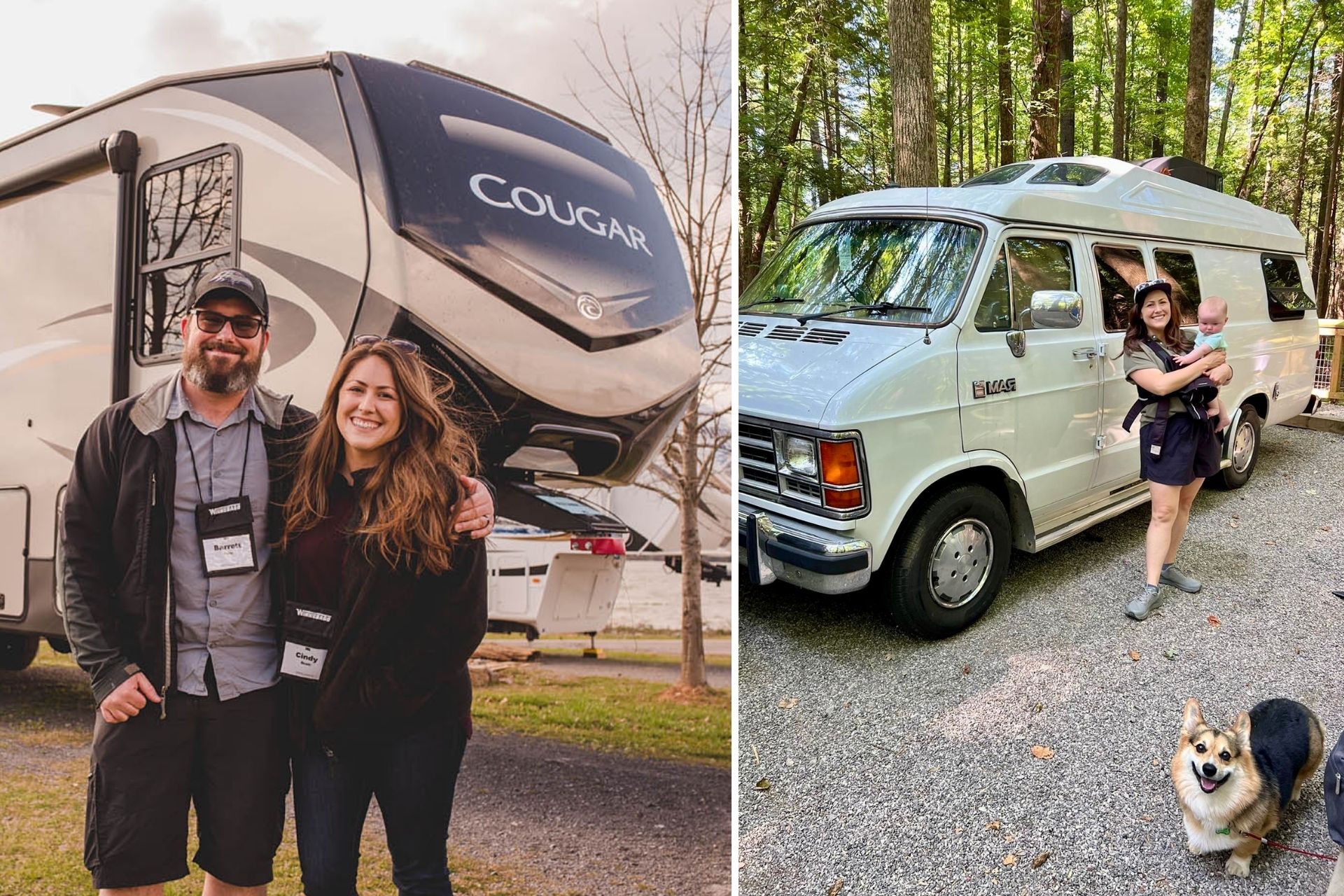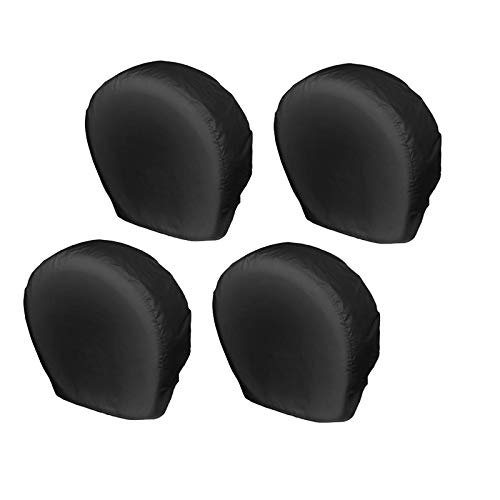Last updated on May 1st, 2025 at 02:12 pm

Hi there! If you’re here, you must be thinking about getting into the fantastic world of RVing. How awesome!
Exploring in an RV is an incredible way to travel and have outdoor adventures! You can constantly visit new destinations, historical sites, and natural wonders while returning to the same comfortable place of your own at the end of every day.
My name is Cindy, and I love traveling, especially in an RV! In fact, my husband and I love it so much that we were full-time RVers for three years. Full-time RVing allowed us to explore and live in many places throughout the United States.
If you’ve been researching RVs, you’ve likely noticed many different RV styles at various price points. Plus, there are a few ways to go about buying one. You may feel overwhelmed by the ample options if you’re brand new to RVs.
Don’t worry; I got you! This comprehensive step-by-step RV buying guide covers the most important things worth considering when buying an RV.
This article details what we have learned after ample research, in-field usage, and experience. It was created as a guide to help answer any questions you may have before purchase, so you have all the information you need to decide whether or not an RV travel style is suitable for you and your family and, if so, what you should know before purchasing an RV.
From the dreaming phase to researching to purchasing, each of these crucial steps will help you choose the right RV for you and your family. I’ll also include some quick notes from our RV purchasing experience.
So, if you’re considering buying a new or used RV, this article is for you! Before taking the plunge, let’s go over everything worth evaluating step-by-step.
Step One: Dreaming Before You Buy an RV
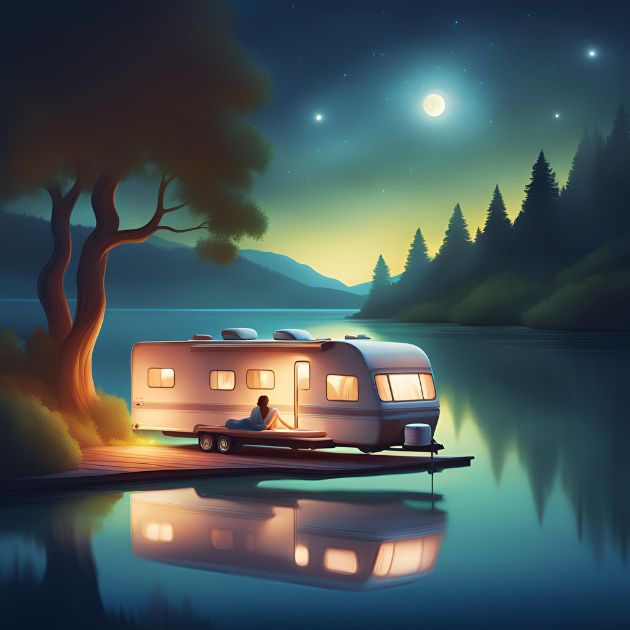
This stage is when you start thinking about owning a camper and going on adventures with it. The dreaming phase is a great time to ask yourself questions and start picturing what your RV trips will look like.
Why Buy an RV?
A great first question to ask yourself is, “Why do I want an RV?” Take a moment to write a few sentences down describing what RVing looks like to you.
What Will Your RV Lifestyle and Camping Style Look Like?
Next, visualize your RV lifestyle. If you’re considering getting an RV, it’s crucial to figure out what your camping trips will be like. Doing so will help steer you in the right direction when choosing which camper style is best for you! It’ll also provide an opportunity to clearly communicate with dealers what type of rig or trailer best suits you.
Here are the lifestyle questions you should be asking yourself in the dreaming phase:
How Often Will You Take the RV Out?
Ask yourself, “How am I going to use this RV?”
How often do you plan on going RVing? Is this a rig you’ll only take out a few times a year? Or are you planning on being a weekend warrior? Or maybe you’ve decided to live out of your RV full-time?
Each time frame leads to a different answer toward amenities you’ll want in your rig. You can make due on short trips with much less than you need for full-time living. So, more bare-bone camper choices will fit those planning on taking a few short trips, but those looking for a full-time rig will want to ensure their rig has everything they need to function in daily life.
Where Do You Want to Camp?
Are you picturing staying for the evening in many state and national parks when you dream of RV adventures? If so, you’ll want a shorter RV to realize that dream, as some parks don’t accommodate huge rigs.
Be aware that up to 25-foot-long rigs are accommodated in most RV-friendly National Parks. However, once you start looking at longer rigs, you may need to find a place to stay elsewhere.
That said, size shouldn’t be an issue if you’re okay with being close enough to these places, disconnecting, and driving a towed or tow vehicle into these parks.
How Do You Plan To Use Your RV?
Next, ask yourself, “What will my days be like?” and “How will I use my RV?” Establishing how your RV lifestyle will look early on can be helpful when figuring out what you need out of a camper. The amenities you will need inside the rig vary depending on your answer.
Will you cook while on trips or eat out? If cooking often, what kind of kitchen space and amenities do you desire?
Are you okay with being hooked up to electricity and water at RV parks, or are you picturing RVing as enjoying the freedom that comes with boondocking? Then, you’ll want big enough holding tanks and to look into an off-grid electrical setup.
What are your bathroom and shower preferences? What kind of creature comforts do you deem necessary for the lifestyle you plan on having with your RV? Know what amenities will make the experience more enjoyable and decide whether those features must be included in your purchase.
You may not need fancy amenities; you may just want enough room for everyone in your family.
How Many People Does Your RV Need To Comfortably Accommodate?
Ask yourself how many people will be going on trips with you in your RV. Then, think about how much space you’ll need for everyone. Where will everyone sleep, eat, and hang out?
Does Your RV Need to Accommodate Pets?
Don’t forget about your pets! RVs make traveling with your dogs and cats very possible. Also, consider where your furry friends will sleep, eat, and hang out.
Create a Must-Haves Wish List

Now that you’ve thought about the above topics, you have a pretty good idea of your RV lifestyle. Just like when you’re house shopping, it’s time to write down everything you’ve thought of on an RV must-haves wish list! This list will be helpful moving forward.
Don’t Rush the Decision
Okay, you’ve been dreaming, and now you’re sold! That’s fantastic! However, I highly recommend you not rush your RV choice.
It’s so tempting in the dream phase to run out to the closest Camping World and pull the trigger. After all, you just spent a lot of time seriously asking yourself if you want to jump into RV ownership and thinking about what you would like from an RV and your RV lifestyle. You’re ready, right?
Completing that step is tremendously helpful! However, there’s still a ton worth considering when evaluating whether or not the RV lifestyle is for you. And there’s still plenty of helpful research you can do before pulling the trigger on an RV to help you avoid regrets later.
Step Two: RV Research. Determine What Style of RV You Want
If you’ve made it this far, you’ve likely decided that RV travel is for you! Great! While there are many benefits to camping and traveling with an RV, there are also quite a few things to evaluate before deciding which rig is best for you.
The wish list you created in step one will be super helpful when deciding what type of RV you want. You’ll quickly discover that even though there are many types of RVs, it’s pretty likely that only one or two styles will fit the specific wants and needs you’ve already listed for yourself.
Let’s next talk about different RV floor plan layouts, RV types, towing options, and brands. Different lengths, layouts, and types of RVs will fill various needs. Researching them will help you choose which RV best suits you and your needs.
Research RV Lengths & Evaluate RV Floor Plan Layout Options
Before anything else, it’s super helpful to figure out how much space you’ll need, what length of RV you’d be most comfortable driving, and how you want your RV space laid out.
Having a decided length and layout will narrow your options and help you pick an RV by giving you fewer choices regarding styles, brands, and towing needs (which we will discuss after this section).
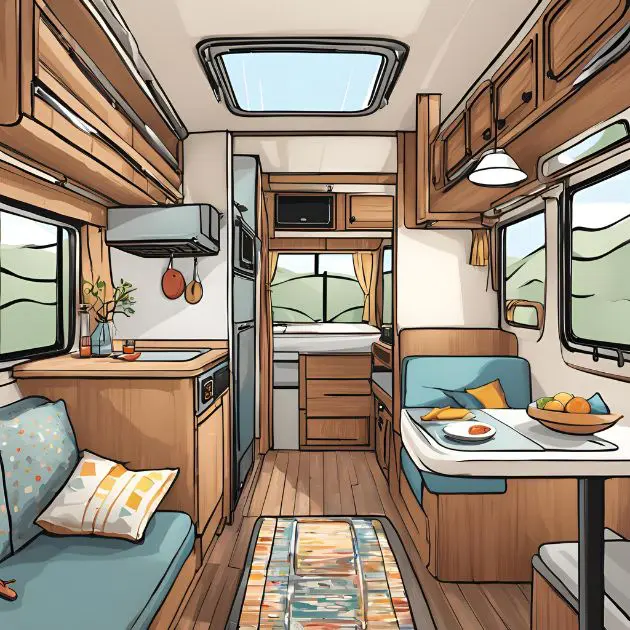
Length
There are two great reasons it’s worthwhile to ponder RV length before layout and types:
1) For Your Personal Comfort
How long of a camper will you be comfortable driving around? The best way to start narrowing down your RV options is to assess the length of the RV you’re okay driving or towing.
2) For Your RV Camping Style
Will your rig fit in the places you want to go? As mentioned in step one, a shorter rig can access more RV and camping spots than a longer rig.
Layout
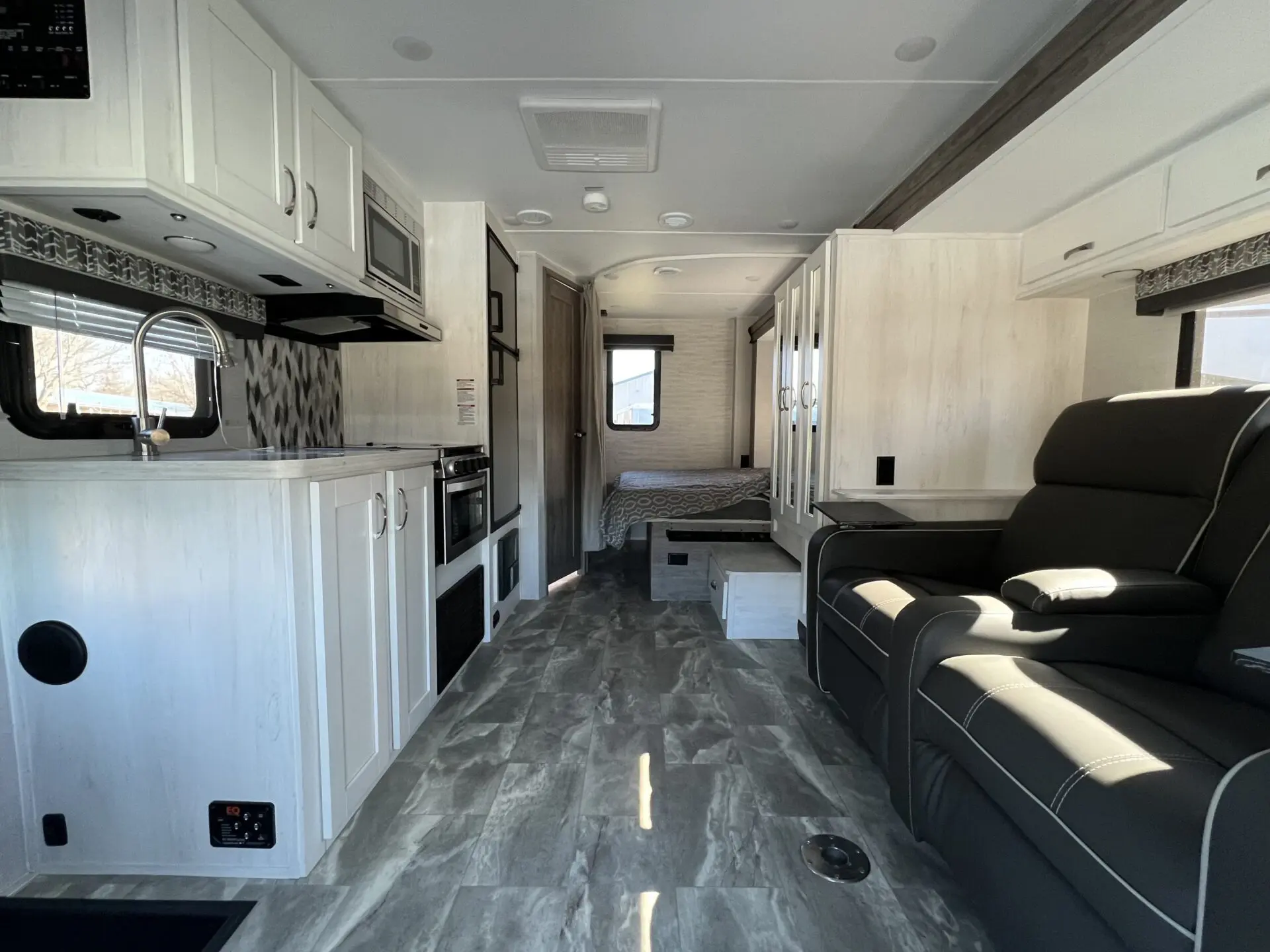
The layout should be evaluated after assessing your dream RV lifestyle and length because those are usually unwavering decisions. Once you’ve figured those out, the amount of layout options will seem much more manageable.
Take a moment to consider the size of your family, what layout would work best for you, and what aspects of a camper layout you most desire.
If you’re okay with the basics, a van, Class B Motorhome, or Pop-Up can be sufficient. But if you want the RV to feel like a spacious home, you will likely be more interested in a Class A Motorhome, Class C Motorhome, Fifth Wheel, or Travel Trailer. And, if your RVing dreams include a four-wheeler, motorcycle, or golf cart, having a Toy Hauler with a garage would be an appealing option.
Think about where you’ll want to relax, work, eat, cook, wash up, and sleep. Are you okay with some of those zones overlapping? And if so, which ones?
When we were RV hunting, we knew we would live in the rig, so we felt it was very important to have space separation, or zones, in our RV layout. Also, my husband enjoys cooking, so he wanted as much countertop space as possible.
So, for our first RV search, we were looking for a Fifth Wheel with a kitchen with an island, a lot of counter space, and a living space that could be split into a living room and an office. A rear living model became appealing to us because it seemed optimal for setting up a workspace, with the couch removed and a desk added. This would provide separate, non-interfering areas to work, cook, relax, and sleep.
Do your best to consider the best layout for you, your family, and your lifestyle.
If you’re unsure, RV shows, a trip to an RV dealer, or renting an RV through a company like RVshare are all fantastic ways to assess length and layout. If you can, bring the whole family. Have everyone walk around in the RV so you can get a good feeling of what it’ll actually be like with everyone. Be as you would be in a home.
Research RV Types
Since an RV search can be daunting, we’ve narrowed down a few things up to this point before looking into RV types.
Now, this section may make you think of something that may change your mind about decisions you’ve made up to this point, but what is likely is you’re really starting to get a clear picture of what your RVing lifestyle looks like to you, which will mean there will only be a few styles of RVs that fit into that picture.
Driveable v Towable RVs
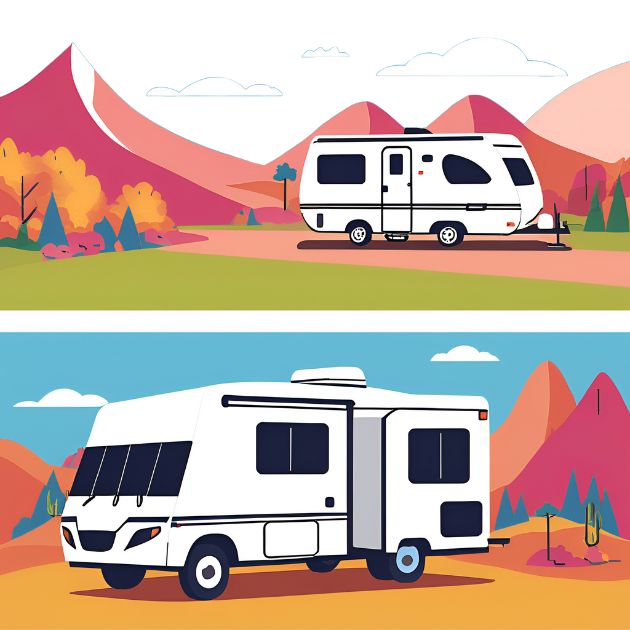
One of the most significant RVing decisions you’ll make is deciding between a driveable or towable RV.
RVs generally fit into two types: motorhomes and trailers. Motorhomes are driveable, while trailers need to be towed by another vehicle.
Would you like to be able to disconnect and take off in a separate vehicle? Or are you okay with you’re home having an engine and being more compact?
Once you decide which of those two types you’d like, you’ll find many different RVs within those two categories.
Here’s a breakdown of each of the different RV types. After I explain each one, I’ll discuss towing options and make a quick note on brands.
Driveable RV Types
These are the three most popular types of driveable motorhomes:
Class A Motorhomes
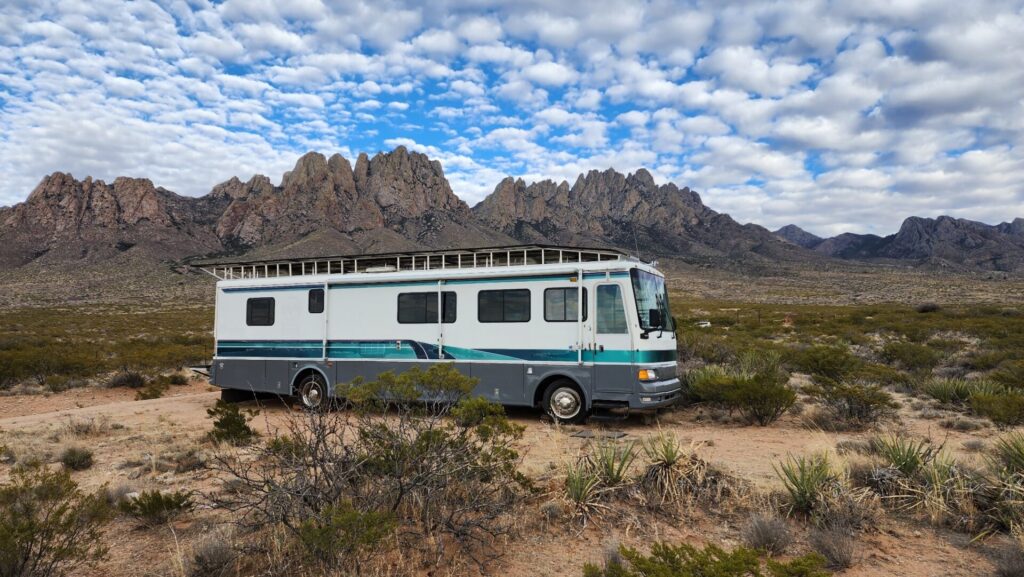
The Class A motorhome is the most luxurious RV class on the market. Its interior has been designed to feel like a home, with wood cabinets, marble countertops, and plumbing fixtures that make it easy to do dishes or laundry during your trip.
The inside of one of these motorized coaches often resembles a luxury hotel suite more than any other type. These RVs are perfect for those who enjoy exploring new destinations without sacrificing their creature comforts!
Class B Motorhomes
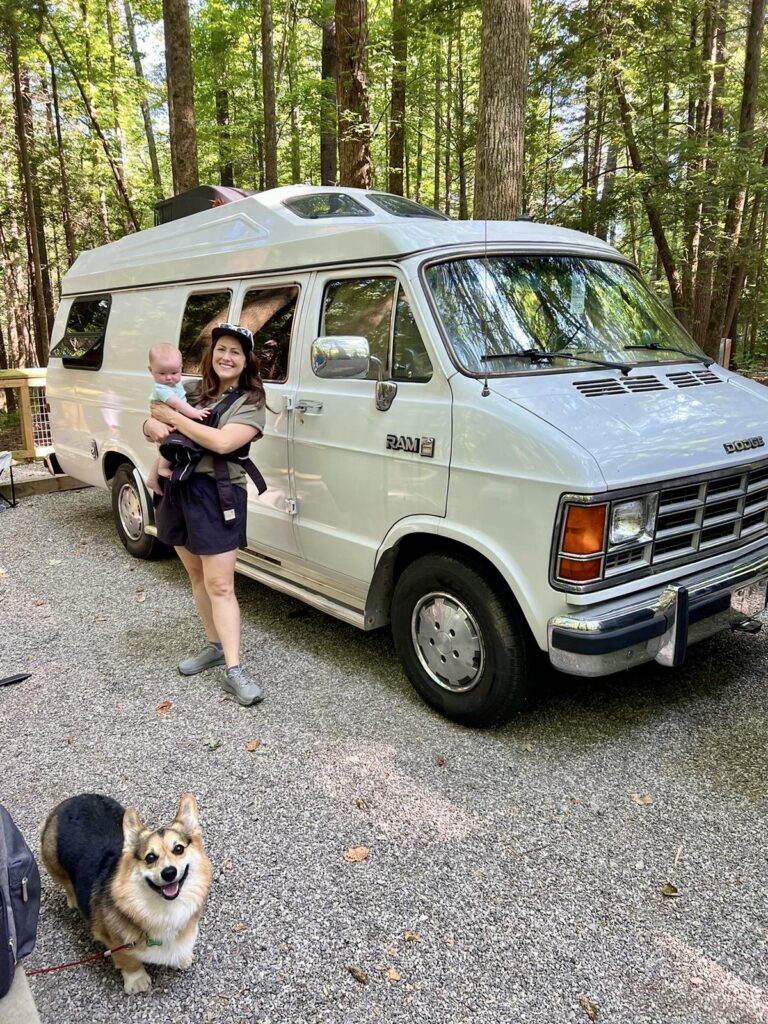
Class B Motorhomes are the trendy “campervan” RV type. They are the smallest of the three driveable options. Class B’s usually have the basics, a seating area that converts to a bed, a wet bath, and a small kitchen area. They are best suited for one to two people or a small family and those wanting a bit more comfort than a tent in a driveable option.
Class C Motorhomes
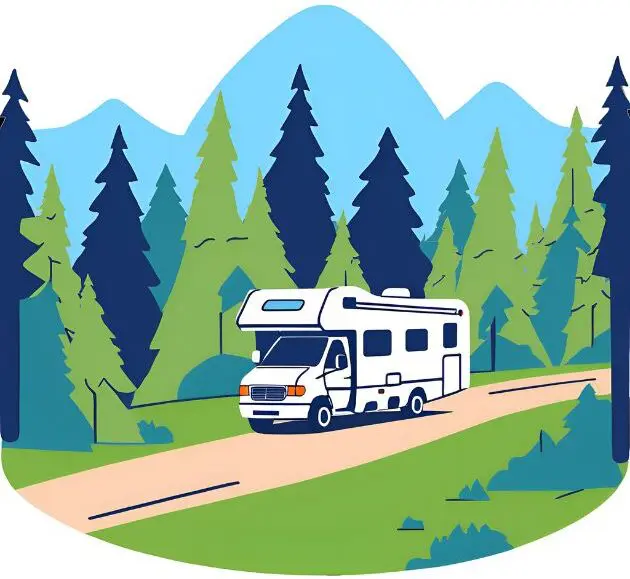
Class C motorhomes are extremely popular and tend to be what many people imagine when they picture an RV.
They are compact, yet they generally still offer full kitchens, bathrooms, and slideouts and sleep four to six people. They are built on a truck chassis, making them one of the easiest types to drive. This also allows them access to spots larger RVs cannot, such as remote campgrounds and state parks. Their “cab-over” profile provides extra sleeping or storage space.
This type of RV can be great for families, couples, and groups of friends seeking adventure.
Towable RV Types
These are the six most popular types of towable trailers:
Fifth Wheels
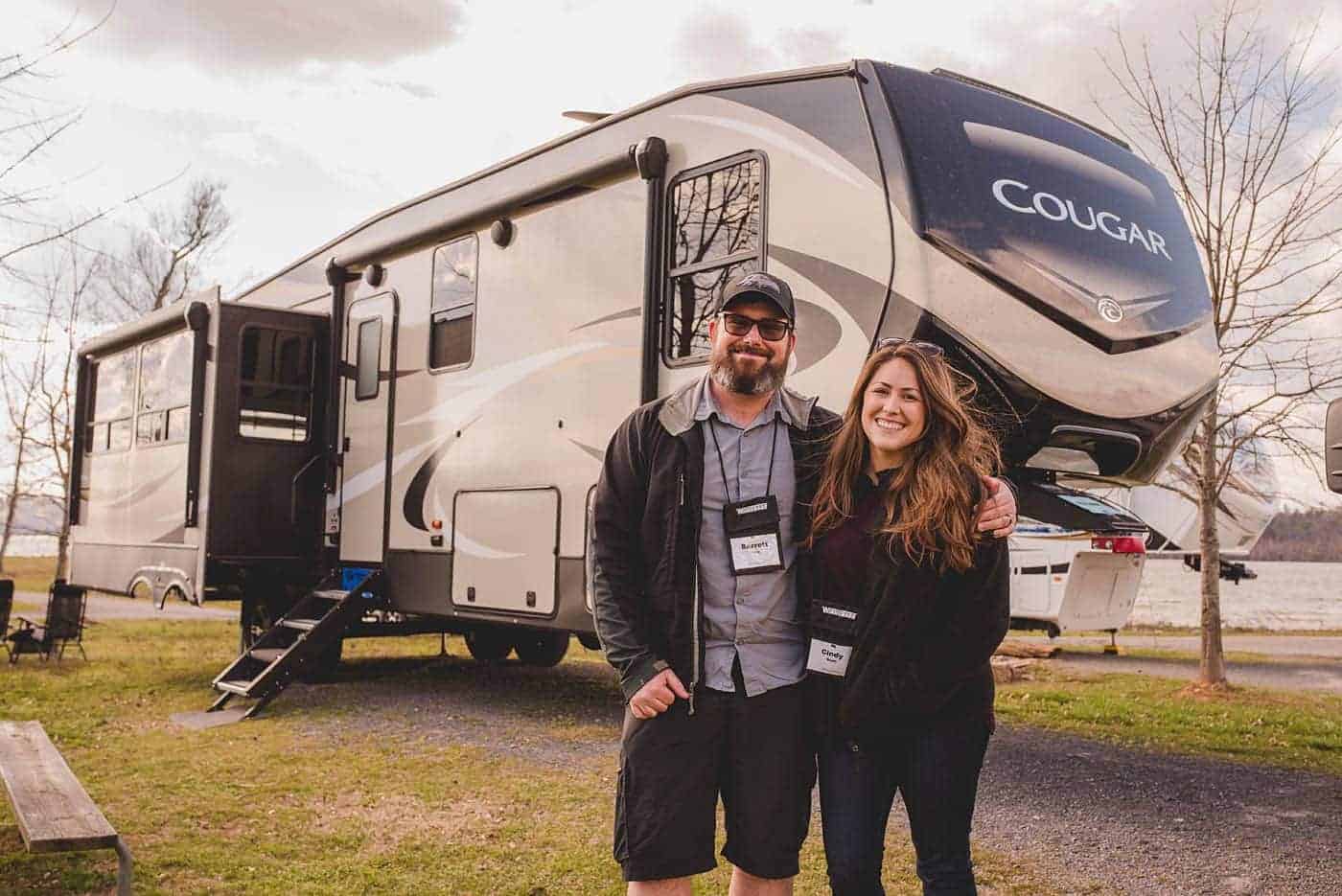
Fifth wheel campers are known for their generous space; some models feature up to six slideouts. They are generally the largest and heaviest towable RVs. To tow them, a pickup truck must be equipped with a specialized fifth wheel hitch in the truck bed. This unique hitch design creates a raised front section that often houses a bedroom or lounge area.
When we lived in our fifth wheel, we would detach our truck at our campsite and then use it to explore the area while the RV stayed parked.
This type of RV is ideal for full-time living or those traveling as a family or with a large group.
Travel Trailers
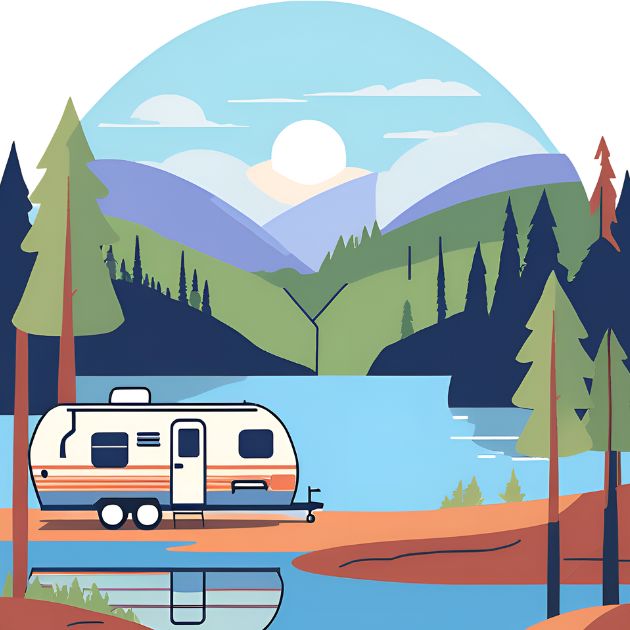
Travel trailers are attached to a vehicle’s hitch, allowing it to be towed to camping destinations. Since they are towed, they can be detached and left at the campsite. They are usually lightweight and more petite than fifth wheels, meaning you have a more extensive variety of vehicle options for towing one. However, they can still be quite large and come in many sizes and layouts, often with full kitchens, bathrooms, and sleeping areas.
Teardrop Trailers
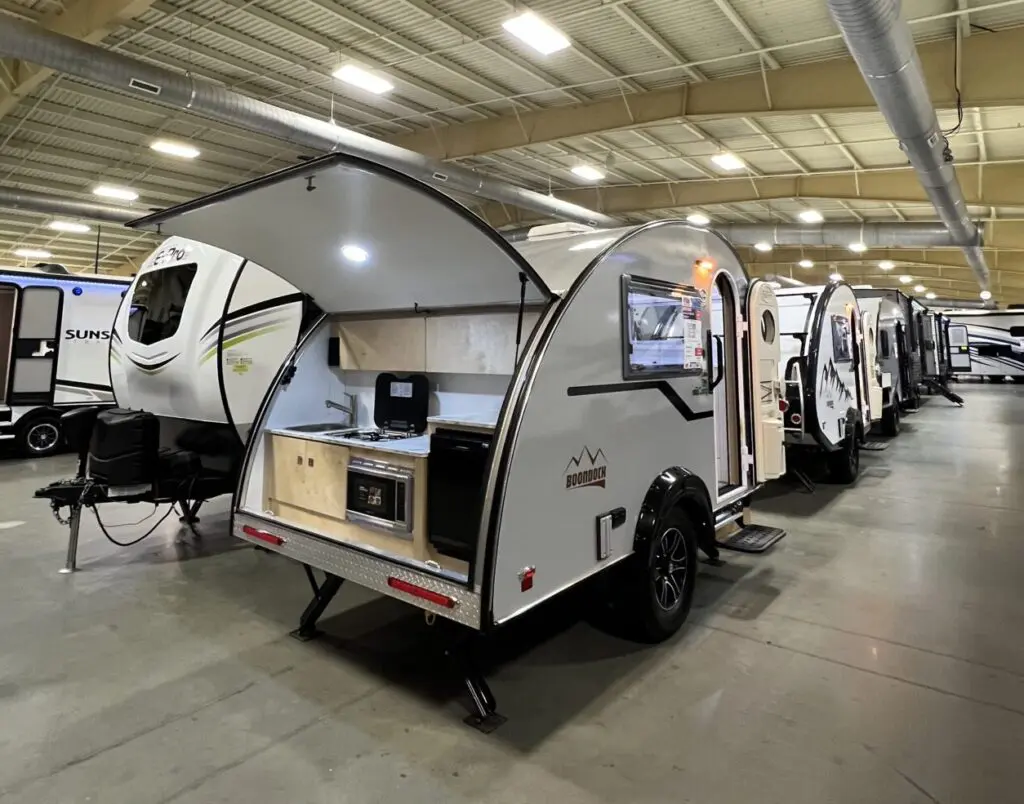
Teardrop trailers are generally used for short trips by campers who merely want the basic amenities. Often, they are just bedrooms, although larger teardrop trailers these days are finding ways to make the small space as functional as possible, adding toilets, wet baths, sinks, and kitchens. They are also often very lightweight and can be towed by just about any vehicle!
Pop-Up Campers
Pop-ups are essentially one step up from tents. They are a towed camper built on a trailer frame with a hard roof and soft walls. They are great for families who want a bit more protection from the elements. They are also lightweight and affordable, meaning they can be towed by almost any vehicle!
Truck Campers
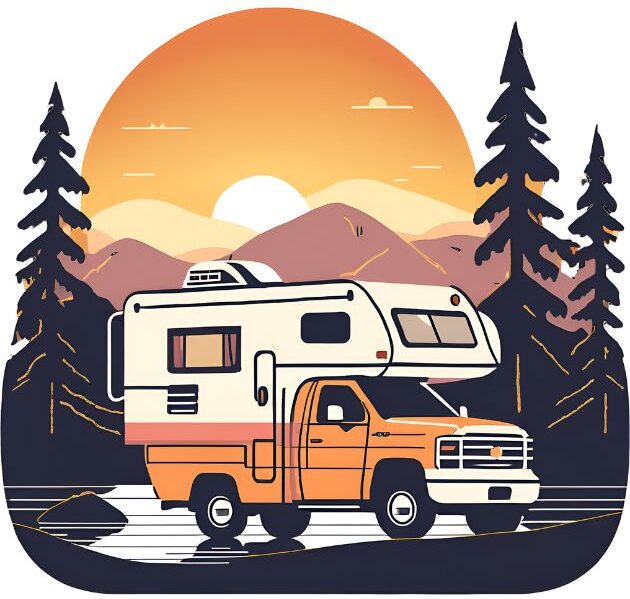
Truck campers are small RVs that fit into the bed of a pickup truck. They are excellent for having some basic comforts while being able to off-road and access harder-to-reach camping areas. They usually include a sleeping area over the cab, a small kitchenette, and sometimes a bathroom or wet bath. Also, you can leave the camper in a spot so the truck can be used without always needing to bring it along on errands.
Toy Haulers
Designed for those who love outdoor fun, toy haulers (also called sport utility RVs) provide ample room to transport motorcycles, dirt bikes, golf carts, ATVs, snowmobiles, kayaks, and more. They have a built-in cargo garage and a door that doubles as a ramp for easy loading.
Offering room for relaxing living and space for gear, these RVs are perfect for sporty travelers who want the best of both worlds—a home on wheels and a mobile garage for their outdoor adventures.
Other (Less Popular) Towable RV Types
A few less common towable RVs include Park Models, Horse Trailers, and Fish Houses.
Park Models
Park models are more often used for temporary housing purposes. Although they are still mobile, they likely do not leave their recreational destination often and are set up by the park or campground.
Horse Trailers and Fish Houses
Horse trailers and fish houses are built for specific owners and activities. You likely already know about these if you are a horse owner or an active winter fisherman. If you are not, you likely do not have a need for these.
Research Your Towing Options
Once you’ve narrowed down what type of RV you want to travel in, you’ll likely need an automobile to tow it, or you’ll want to pull a smaller vehicle along with you so you don’t have to pack your rig up every time you want to run an errand.
Will You Need an Automobile to Tow Your RV?
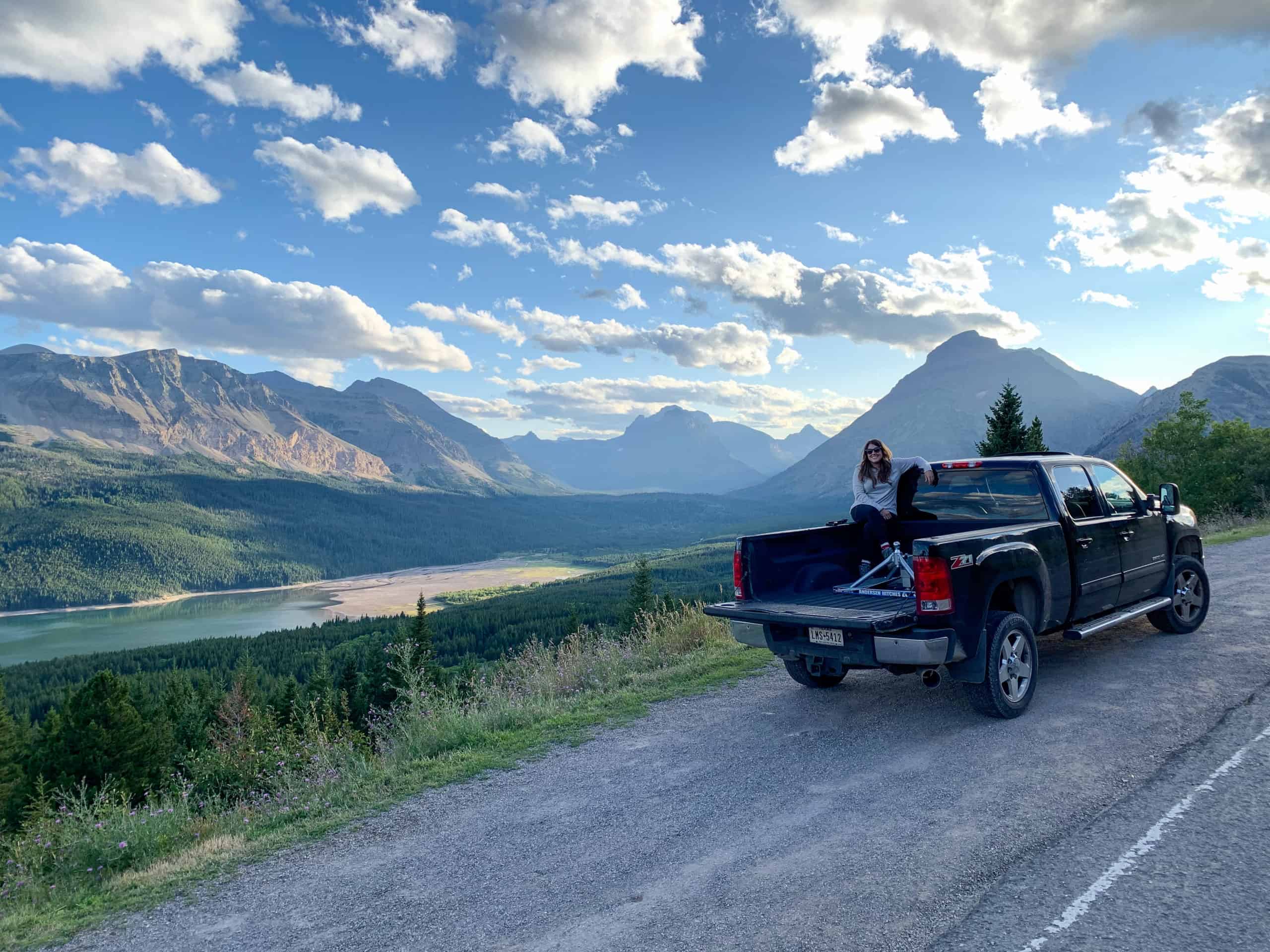
When researching and considering towable RVs, it’s essential to ensure that your towing vehicle can safely handle the total weight of the RV and its contents. You’ll need to know how to match a tow vehicle with the trailer you’re considering.
If you’re purchasing a travel trailer, you can find out if your vehicle has the power required to tow the RV you’re looking at with these simple steps:
1️⃣ Add up the dry weight of your RV, your cargo weight, and the weight of any liquids in your tanks. This is the total weight of your RV.
2️⃣ Use Camping World’s Tow Guide, which can be found here, to determine your vehicle’s towing limit.
3️⃣ If your vehicle’s tow limit is higher than the total weight of your RV, theoretically, you can tow the RV behind your car or truck. The more significant weight gap you leave between those two numbers, the better off you are.
For fifth wheels, you also need to take payload into account and make sure your truck’s bed can accommodate your fifth wheel.
Or Will You Need to Tow a Small Car or Truck?
For those looking into motorhomes, you’ll want to decide whether to tow a small car or truck behind your rig. You must ensure the vehicle you want to tow is within your motorhome’s towing capacity.
Research RV Brands
Another way to narrow down your options as you conduct your research is to pick a preferred brand.
I get asked, “Which RV brand is best?” a lot. While I don’t think there’s an answer to this question, there are definitely brands that are better than others and brands that ultimately make RVing a bit easier.
And if you’re buying new, I do recommend putting more energy into researching brands than sellers. Researching RV brands is noteworthy for a couple of important reasons:
1️⃣ You want a camper that’s built to last. Since you’re investing considerably in something that will lose value over time, spending wisely on a reliable brand that makes a quality product is essential. Get the 411 on the brand’s quality and construction before purchasing one of their rigs.
2️⃣ Owning a camper that can be easily serviced across the US is easier. Big brands have a leg up in service times because their parts are easier to come by.
Of course, you should do your own brand research on forums and reviews, but I will tell you what we found after a decent amount of research. We found that the Keystone Cougar brand had a fantastic reputation, and there were a LOT of them on the road, meaning they would theoretically be a quality brand that would be easy to service across the country. (And I can vouch for that. It ended up being accurate on both counts for our Keystone Cougar.)
Step Three: Extended RV Research
So, you’ve compiled your lifestyle plans into a wish list and now have also included your favorite layout, type, towing needs, and preferred brand. You may have thought you were done with your research. However, a few more things are worth considering before purchasing an RV.
Here is everything else you should evaluate before buying an RV:
Deciding Between Buying a Used or New RV
Do you want a brand-new rig? Or is used okay with you?
Pros of a New RV:
- You get a shiny new rig that no one else has ever lived in before you! And sometimes even the ability to customize the rig to your liking.
- You’ll initially get a manufacturer’s warranty to help you with any dud parts.
- All of the electronics will be the newest version on the market.
- As long as everything was initially built well, you should be able to avoid major repairs for a while in the beginning.
- You’ll be able to finance the vehicle if purchasing from a dealer.
Cons of a New RV:
- You pay a higher fee when getting a new rig. The moment you drive it off the lot, its value has depreciated.
- If there are any bugs or quirks from manufacturing, you’ll have to deal with those.
- You’ll pay dealer fees.
Pros of a Used RV:
- A used RV will be much cheaper than a new RV.
- You can resell a used RV for much closer to the price you purchased a used RV at.
- You may get an upgraded rig with additions like an internal surge protector, solar setup, or upgraded batteries.
- You can get a rig from someone who has already worked the new RV kinks out.
Cons of a Used RV:
- It can be harder to get a warranty for a used RV.
- Depending on how well the rig was taken care of, you’ll likely need to work on repairs soon after purchase. Even if the owner was meticulous, older RVs generally break more often than newer ones.
- Technology in the rig is more likely to be outdated.
Budgeting for an RV
Budgeting for an RV is similar to budgeting for a car. You’ll want to review your finances and determine what monthly payment you can afford to spend on an RV.
The Cost of an RV
Owning an RV has four main cost components: RV payment, insurance, roadside assistance, and extra fees.
RV Payment
Used RVs can be more budget-friendly but more challenging to finance. Often, you need a large chunk of change upfront.
New RVs are more expensive, but if you can find a low interest rate, you can spread the payments out into a low recurring monthly fee over a longer amount of time via RV financing.
Insurance
Be sure to assess how you will insure your RV. The basics are:
- Most states will require you to have liability insurance for motorized RVs (Class A, B, C).
- You’ll also want collision and comprehensive for any damage that may occur to the RV.
Beyond those, you can add many additional protections, including Personal Injury Protection, Uninsured/Underinsured Motorist Coverage, Personal Effects Coverage, and more.
How often you use the RV will also affect the type of policy you need. If you plan to use your RV as your primary residence, be sure to look into having Full-Timer Coverage, which will insure the RV similar to a home.
Roadside Assistance
Roadside assistance is another fantastic coverage all RVers should consider having. In an emergency, these policies include help with towing, tire changes, refueling, or getting you into your rig if you’re locked out.
Tax, Title, & Registration
To prepare your RV for the road, you must also pay your state’s sales tax, title fees, and registration fees.
Make Sure You Accounted for Future RV Hidden Costs
Many hidden costs creep up on RV owners. When doing your extended research, make sure you’ve considered how all of the following costs will affect your budget.
Gas
Research gas mileage ahead of time so you aren’t shocked by how much gas you’re about to spend in your RV. Almost all RVs get fairly lousy gas mileage.
If you plan on towing a trailer, the vehicle you tow with will also get worse gas mileage than you’re used to
If you plan on running a generator, that will also cost you gas.
Learn the fuel economy of the RV situation you want to go in on, the current fuel costs, and the mileage you think you’ll be putting on the rig each year. You can estimate how much you think you’ll spend on fuel if you know all those factors.
Start-Up Supplies
Regarding start-up supplies, if you buy from a dealer, they will try to sell you many “new to RVing” items while you’re there.
I recommend you instead figure out what you need as you go. Camp near a city on your first few trips so you can easily buy things as you figure out you need them instead of buying everything they initially throw at you at the dealer.
As far as RV essentials go, you can find my top recommendations in the most essential categories here:
👉 RV Must-Haves: The Top 10 Essentials for RV Camping Newbies
👉 RV Must-Have Water Accessories
👉 RV Must-Have Sewer Supplies
Tools
If you’re coming from a house, likely, you’ll already have a lot of tools to bring along with you, but if you’re coming from an apartment or a landlord situation, you may need to load up on some tools you’re not used to owning.
Here are a few basics worth looking into having:
No products found.
- Additional Tips - The following incorrect operations may cause the multimeter not to show results: Firstly, the plugs of test leads are not fully inserted or not inserted into the correct sockets. Secondly, the manual rotary switch is not placed in the correct position. In addition, this meter can not test all AC Current and below 100mV AC Voltage. Please check the user manual carefully before measurement.
- Tire Inflator Kit: Say goodbye to tire troubles with the VIAIR 400P-RV Automatic Portable Compressor. Our air compressor offers a versatile and dependable solution at all times, whether you are on a leisurely road trip or in an urgent flat tire situation
You can find more information on my top recommendations in the tools category here:
👉 RV Fundamentals for Emergencies, Safety and Maintenance
Accessories & Upgrades
Making your RV your own is always fun. There is a massive market for RV accessories and upgrades, from bike racks and kayak carriers to internet and solar upgrades!
Feel free to review my top recommendations in each RV category below.👇 Then, you’ll know to budget for whatever you want to add to your rig.
You can find more information on my top recommendations in accessories and upgrades here:
👉 RV Kitchen Accessories
👉 RV Bedroom Accessories
👉 RV Closet & Organization Accessories
👉 RV Laundry Items
👉 RV Bathroom Accessories
👉 RV Living Room Accessories
👉 RV Internet Necessities for Those Working From an RV
👉 RV Boondocking Essentials
👉 Fun Outdoor Camping RV Items
👉 For Those Traveling with Bikes
👉 For Those Traveling with Pets
Hitches (If You’re Getting a Towable RV)
If you’re purchasing a travel trailer or fifth wheel, be sure to budget for the necessary hitch and safety chain costs.
Storage
Where will you store your RV? If you won’t be living in it full-time, you should evaluate this question before purchasing your rig.
Home
If you have the space at another property you own, this is ideal because it’s free!
Storage Facility
Storage facilities vary wildly in price and can be hard to find. If you choose this option, call around to find the best deal in your area.
Items You Will Need for Storing Your RV
You’ll want to think about purchasing a few things to protect your RV while it’s in storage.
RV Cover
If your RV is going into uncovered storage, RV covers help protect it from elements such as ultraviolet sun rays and weather.
High-quality covers are made of durable, breathable, water-resistant materials, such as polypropylene or polyester. Using a quality cover, as opposed to a tarp, means it has vents that facilitate moisture drying, preventing mold and mildew buildup.
Here is an example of an RV cover:
- Keep the exterior of your 5th-wheel camper in pristine condition with this cover that has secure straps and buckles, making installing or removing when needed easy
Wheel Covers
If your RV will be sitting for a bit, sturdy, UV-treated, and water-resistant wheel covers are also a wise investment. They will protect your tires against damage from the weather, sun, and dirt that can occur over time.
Shop for a four-season cover that comes with a good warranty, such as these:
- Universal Fit - Refer to our fitting guide picture for size selection, set of 4 covers fits entire tire diameter up to: 26''-28.75'', it’s NOT the rim size. Any questions can seek solution from us by email.
Regular Maintenance
RVs require regular maintenance similar to that of a car. You’ll have to monitor and schedule things such as getting its tires rotated, bearings repacked, brakes looked at, oil changed, and tires replaced.
You’ll need to consider whether you’ll be doing these repairs yourself. If not, you’ll also need to ensure you’re budgeting for a mechanic to do them.
Not So Regular Maintenance
Brand new RVs will still have problems, but they also hopefully come with a warranty. The bigger problem with big repairs for new RVs is that they can take months. You may end up getting stuck somewhere unexpectedly for a while.
If you buy used, you’ll need to prepare for the costs of repairs since used RVs are often purchased without a warranty. Be sure to set aside a savings pot in case something breaks.
Campground Fees
Campground fees can add up quickly. If you’re staying at a campground for a while, ask about whether they have cheaper weekly or monthly payment options.
You can also join many membership clubs to save, including Passport America, Harvest Hosts, and Escapees.
Q: Is there a discount for Harvest Hosts?
A: Yes! You can use my code CINDERS20 at checkout to get 20% off your membership.
Entertainment, Activities, & Dining Out
Don’t forget to account for the activities you’d like to enjoy while out on your camping adventure!
Evaluate Ways You Can Save Money
Two really great ways to save money while owning an RVing are:
1️⃣ Enjoy your campground and its cheap entertainment options, such as games around the campfire and hikes throughout the park.
2️⃣ Consider renting your RV out when you’re not using it.
(Optional) Step Four: Renting an RV Before Buying One
RVs are a great way to travel the country, but they’re not for everyone. They can be expensive and difficult to maintain, which is why so many people rent them instead of buying them.
By now, you’ve narrowed your RV search down to a desired layout and type. Renting an RV is an optional step but recommended because it is a great way to test out what you’ve deemed suitable for you and your family.
Since RVs are a huge, expensive, depreciating asset, it’s always good to feel confident about the RV style and type you’ve picked before purchasing. Walking in and out of countless RVs at an RV show is helpful. But once you’ve narrowed it down, going on a camping adventure with the whole family in a rental RV similar to the RV of your dreams is even better!
Here are seven benefits you’ll get from renting an RV before buying one:
1) You’ll Get a Feel for the Internal RV Layout
Once you’re in the rental, pay attention to how you and your family use the rig and test whether the layout you chose is a good choice.
2) You’ll Become Comfortable with RV Driving
I still find it utterly wild that you can simply walk into an RV dealer, buy a gigantic RV, and drive it home.
If you’ve never driven anything other than a car, SUV, or truck, you’ll discover there’s a learning curve for driving something as large as an RV. When renting, you’ll get to review the RV type you’re looking into with the owner, who will help you understand and feel comfortable with the vehicle before you take off. A rental can help you confirm that you are comfortable driving a particular RV style before purchasing one. You can reaffirm choices like whether or not you prefer towing or being contained in a motorhome such as a Class B.
3) You’ll Get Familiar with Day to Day Functioning in an RV
If you’re new to RVs, there will be a learning curve. If you come from a brick-and-mortar home, you’re probably used to dependable electricity, Wi-Fi, and hot water. Yet, there’s a lack of dependability involved with all three in an RV.
Renting an RV first will make that less of a shock.
4) You’ll Get a Feel for RV Construction
RVs are made of lightweight materials so they can travel down the highway. Their lifestyles, matched with the basic materials they’re made of, eventually cause them to fall apart. If the fragility of RVs concerns you, rent an RV to experience it firsthand and become comfortable with the fact that it will regularly break.
In the first few months of our full-time RV life journey, our blinds snapped, our slide ripped a tear in our floor, and our antenna and refrigerator panel both fell off our rig somewhere along the highway. These concerns are relatively small compared to some major things that can go wrong with RVs.
Once you realize that RVs break, you’ll get comfortable in that mindset and enjoy the journey more.
SIDE NOTE: Opt for insurance to protect you from the inevitable when renting.
5) You’ll Be More Familiar with What Extra Items You’ll Need to Purchase
If you’re new to RVing, figuring out what you’ll need can feel like a big guessing game. Renting an RV is a great way to determine what you must pack for RV trips. After three years on the road, we found we could live with much less than we initially realized.
An RV can quickly feel packed. Before moving many items into your camper, it’s helpful to have a clear idea of what you’ll actually need to have with you.
6) You’ll Avoid Buyers Remorse
Since RVs are depreciating assets, you want to feel confident about purchasing one. Renting a camper allows you to test the RV of your dreams and ensure that you won’t have any regrets about that camper style.
7) You May Find Out You Don’t Want to Own an RV
You may go through a rental or two and find out RV sharing is a better option for you and your family. That’s great, and it’s definitely better to find out before purchasing one.
Step Five: Purchasing an RV
Okay, you’ve done a lot of dreaming and research! Now, you’re ready to move on to the purchase phase. Fantastic!
There are two main ways to go here: new or used. Here’s what to know about the RV purchase process, depending on which direction you decide to go.
Buying a New RV
When to Buy a New RV
When is the best time of year to buy a new RV? It can vary, but the RV industry has a bit of seasonal dependability. Generally, when new models are being rolled out, the dealers need to make room for them, meaning getting rid of the old!
Generally, new RVs are shown off in autumn, and then they take the time to start producing those rigs. Then, the new RVs begin to show up at dealers in the spring, ready for purchase right before the summer RVing season.
Shopping for a year or two old model in the spring can work in your favor. Another great time to buy can be at the end of the summer camping season.
Where to Buy a New RV
There are two great spots to buy a new RV:
RV Shows
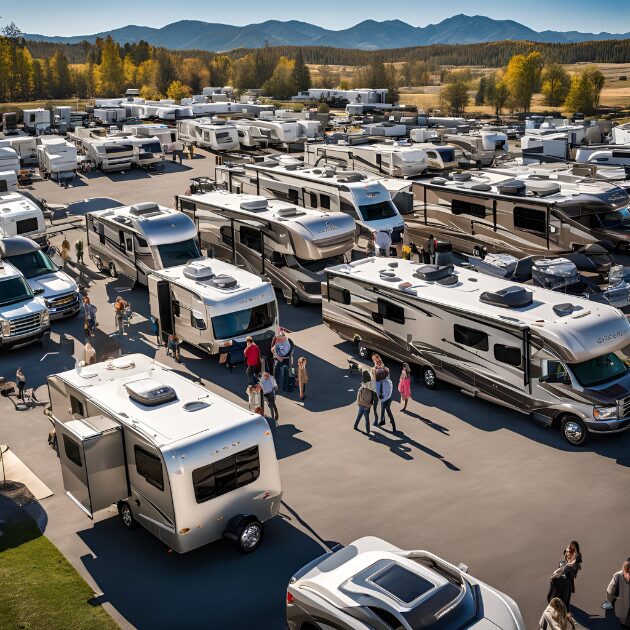
RV shows are an excellent place to get a fantastic deal on the rig of your dreams! That said, make sure you know what you are looking for ahead of time. It’s easy to get lured into an impulsive decision when the deal seems too good to pass up.
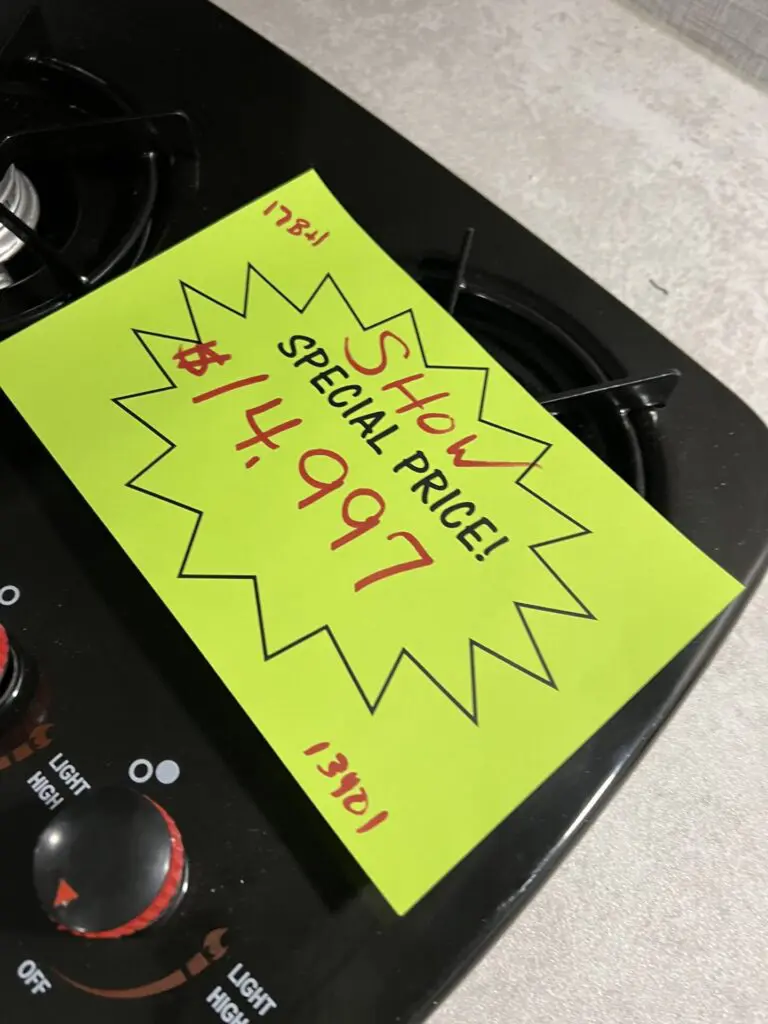
But if you’re at an RV show, you know what you want and find it on special, go for it! We’ve noticed that last-day deals are often even lower if you really want to gamble!
Dealers
Or you can buy from a dealer. Here are the most important things to know ahead of time when working with dealers:
(Everything in this section is generally true, but it is not a guarantee; it is just noted from what I’ve noticed over the years.)
Be Ready to Negotiate
When at the dealer, look up the RV’s MSRP on NADA. Generally, the MSRP is 30-35% higher than the price at which they plan to sell the RV. So, if their sticker price is similar to the MSRP, you have room for negotiation.
Also, compare the prices of the RV you’re looking at against offers from other dealers.
There Will Be Extra Fees
Additionally, note that the price you agree on will not be the final price. There will be added fees, including setup and transportation fees because the RV on the lot is often not the RV you’re purchasing. The dealer will frequently find another one and send it to them for you to pick up later.
An Extra Note on Buying a New RV: After Purchasing, Get a Walkthrough
RV dealers offer a walkthrough of your RV after purchase. I highly recommend scheduling this, especially if you are new to RVs. This will probably be the first time you’ll see your unit fully functioning. They will take their time with you and show you how everything operates.
Things in an RV work differently than in a house. You need to know where everything is and how it functions. They will point out many things you didn’t even know you needed to know.
Buying a Used RV or Pre-Owned RV
How to Buy a Used RV or Pre-Owned RV

If you are looking for a used RV, you likely don’t want to pay the initial cost of owning one or are simply looking for a good deal.
How to Determine Fair Market Value
Use NADA to understand the fair market value of the RV you are purchasing.
Get an Inspection
Have the RV inspected by a third-party professional before making a purchase. Make sure everything works and that they specifically check for:
- Interior Damage
- Mold
- Floor Damage
- Exterior Damage
- Tire Damage
Get The Rig’s History
Where is it coming from? How did they use it previously?
Interior States: When looking into used RVs, one from an interior state has one very good thing going for it that should be mentioned. It’s less likely to have salt and water damage.
An RV from a snowy area where they salt the roads or the coasts, especially wet coastal regions, is very likely to have issues sooner than one coming from a dry area due to the abuse it has likely taken from those elements.
Flood: A flood-damaged RV will sometimes not be able to be insured since it may already have serious water damage. Make sure you check before buying.
Test Drive the Rig
A test drive should be fine for the seller. This way, you can get a feel for the rig, how it drives, and how it feels to drive something of its size.
Where to Buy a Used RV or Pre-Owned RV
There are a handful of options when it comes to buying a used RV:
Online Marketplaces
There are many RV marketplaces online available to purchase from. Some of the most popular ones include:
Each site has its own selling methods and guarantees. Before buying an RV from one of them, be sure to be aware of the protections each site does and does not offer purchasers.
Dealers
The pros of buying a used RV from a dealer are that you don’t have to deal with the previous owner, you know the dealer’s mechanics have given it a once-over, and often, the dealer will sell you a warranty with the used rig, verifying that they trust in their in-house inspection. You can also still hire a third-party inspector to inspect rigs being sold at a dealer.
Additionally, you can likely finance a used RV when purchasing through a dealer. The dealer advantage gives you more peace of mind about your purchase.
Auctions
Auctions take a specific buyer. Unless you’re really good at auctions, I’d avoid this one.
An Extra Note on Buying a Used RV: Avoid Scammers
Never buy an RV you can’t first see in person and verify the VIN and vehicle history report. Also, anyone asking you for money upfront is likely a scammer.
A Few Extra Tips to Remember When You’re on the Road
Here are a few more super essential things to know before hitting the road:
Know the Specs of Your Rig
Google Maps is not made for RVs. Before hitting the open road, be sure to know your RV’s height and weight and have some form of GPS or a subscription to trip planning software that includes GPS (such as RV Life Pro) that can take those measurements into account.
👉 You can read more tips about helpful tools for planning an RV road trip here.
Also, Know About Your Tanks
Understand the difference between your black and gray tanks and how to keep them flushed. Tank sensors can become covered over time and are likely to say the tanks are more full than they actually are later. Don’t always trust the readout.
Also, take necessary measures to ensure your tanks don’t freeze when camping in cold temperatures.
RV Mechanics Are Not Always Easy to Find
As mentioned above in the section about RV brands, picking a mass-produced RV will make replacement parts easier to come by. However, no matter how popular your rig is, RV mechanics can still be tricky to find. Be aware that if something goes wrong, you’ll likely have to wait for it to be fixed, and it’ll likely be more of a wait than you’re used to.
You Won’t Need as Much as You Think You Will
I briefly stated this above, but it’s important to reiterate: RVs fill up fast!
When we first started full-time RVing, we brought so much stuff with us! The honest truth is, you don’t need much more than you would bring along in a checked airport bag. If you can, try to start with as little as possible and add as you go.
Know that RVers, in General, Are Awesome!
RVers are a typically considerate and friendly community. If you’re having a problem, ask others around you for their advice.
You’re Going to Have a Great Time!
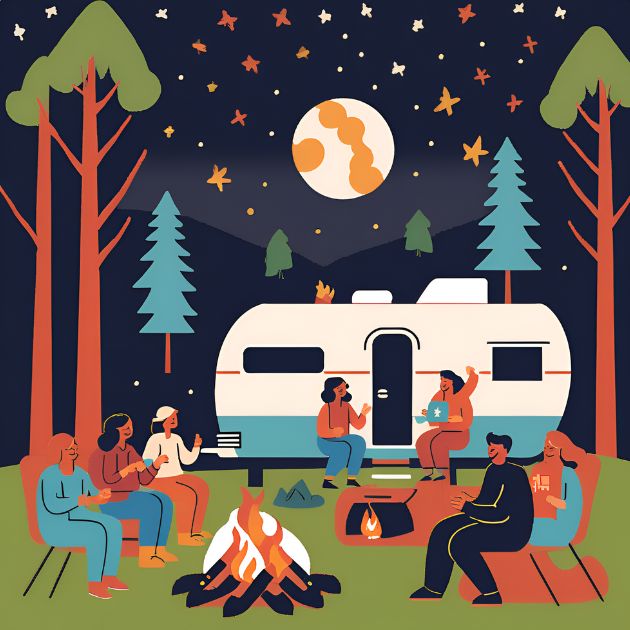
I’m so excited for you! Please make the most of your new camper and enjoy the journey!
Wrap Up: What To Know Before Buying An RV
I’ve listed all of this information to help you understand the basics of what goes into purchasing an RV. My goal was to show you that with a few focused steps, the RV-buying journey does not have to be daunting!
Considering these topics when looking for an RV will make your decision-making more straightforward in the long run! The more tools you have to make an informed decision upfront, the less likely you will have problems after purchasing.
If you feel I’ve missed any considerations, let me know, and I’ll update this guide!
You May Also Enjoy:
👉 The Definitive List of RV Must-Haves for 2025 (From a Full-Time RVer)
👉 51 Answers to Your Most Pressing Full-Time RV Living Questions
👉 4 Important Questions That Will Help You Choose Between Van Life or RV Life

